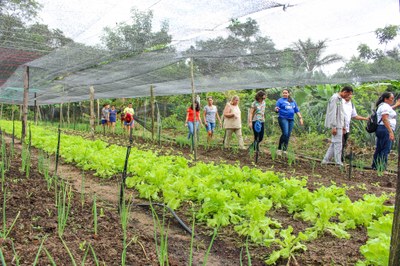Partnership brings together PPA, USAID, Alcoa and local institution to consolidate sustainable agenda in Juruti, Pará
Their goal is to develop an institutional strengthening plan and help build a Juruti 2030 Agenda
The Sustainable Juruti Institute (IJUS, in the Portuguese acronym) was created just over ten years ago. In the coming months, it will undergo the development of a 2030 Agenda for the town of Juruti and its surroundings. With about 58,000 people, Juruti is located in the Baixo Amazonas mesoregion, and its economy is based on bauxite, livestock and family farming.
The PPA (Partnership Platform for the Amazon), USAID/Brazil and CIAT (International Center for Tropical Agriculture) have joined efforts with Alcoa and IJUS in order to strengthen IJUS and its activities.
One of the step took place early last month (between March 2 and 6), when a group of representatives visited Juruti to learn more about the joint venture. “The invitation from IJUS and Alcoa, who are members of the PPA, was very important because this municipality has become an example to be replicated,” said Anna Toness, USAID's Environment Director in Brazil, during a Juruti City Council session held in March.
For Fábio Abdala, Alcoa's Sustainability Manager, IJUS has the legitimacy to propose a sustainable 2030 Agenda to society, the State and private companies. "We have realized that it is necessary to introduce institutional improvement measures at IJUS, including reviewing its own vision as an institution, as a place for monitoring and learning, and as a financial instrument. We are going to take a step together with USAID towards strengthening the institute so that it can become the very tool proposed by the 2030 Agenda,” he added.
Since 2009, Alcoa has operated a bauxite mine in the municipality of Pará. It has also implemented the Sustainable Juruti project and has been developing other projects to help improve regional sustainability.
Future – CIAT representative Denyse Mello, who took part in the visit, said that the next steps are to validate their Terms of Reference, hire consultants to produce a Theory of Change, and support the development of strategic planning, which will include both plans and goals. “We considered stopping our activities because of the COVID-19 pandemic, but we then realized that we could use this time to develop robust Terms of Reference, establishing each party's expectations in this process," she said. IJUS has suspended all its field work at least until June due to COVID-19, as many Brazilian municipalities have imposed social isolation measures to contain contamination by the new coronavirus.
The consultants selection process is expected to launch in early May. “Our actions are always based on data and analyses of our territory. It is now time to move forward in a more concrete way,” said IJUS President Idaliana Albuquerque during her visit to the municipality.
The creation of IJUS – The state of Pará concentrates almost 75% of Brazil's bauxite reserves. Minas Gerais comes next, with 16%, and the rest is spread over seven other Brazilian states. The Juruti mine, which started operations in 2009, has a potential bauxite reserve of 700 million metric tons. Its operating rate is 7.5 million tons of high-quality ore per year.
IJUS was created against this background of mining operations in Juruti, and has recently been certified as a Civil Society Organization of Public Interest (OSCIP, in the Portuguese acronym). IJUS aims to provide a permanent public space for dialogue and discussions aimed at aligning collective actions among its members and society as a whole. It carries out its activities through the Sustainable Juruti Council, which discusses strategies for local development, and the Sustainable Juruti Fund, a financial investment tool.


